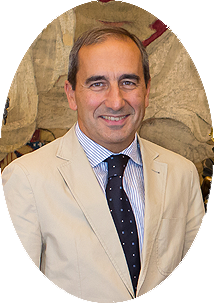The words
A historic homily
Although it was published as "Passionately Loving the World," for professors, students and friends of the University it will always be the "homily of the
Friends of the University it will always be the "homily of the campus"
October 8, 1967, Sunday of the twenty-first week after Pentecost, 10:00 am. On the esplanade of the Library Services, a Mass was celebrated on the framework of the Second General Assembly of the association of Friends. There, before more than 20,000 people, St. Josemaría gave what is known as the "homily of the campus", which 15 years after the founding of the University, condenses the pillars of its identity.
The sheets of paper for the reading of the homily had been prepared in a slightly larger font than usual, so that they could be read easily. This was unusual for St. Josemaría, who hardly ever took any notes when he preached, but on that occasion he read his homily in its entirety. And he did so in a slow and solemn tone, with extraordinary force. In addition, the printed text was distributed among many of those attending the Mass, to make it easier to follow.
And not only was the time of its reading taken care of to the extreme. His essay was also full of revisions, corrections and re-readings. This gives an idea of the importance that St. Josemaría himself gave to these words. It was a text that he had thought through word for word, and that he wanted to say in and from the University of Navarre.
In his homily, St. Josemaría wanted to mention "the secular nature not only of the faithful of Opus Dei, but also of the apostolic labors they promote, the nature and goals of the association of Friends, the right of the University to receive subsidies from public entities; mission statement School and the express clarification that Opus Dei's purpose was not to direct diocesan seminaries, in order to overcome the unfounded fear about the implications that the future establishment of a theology department at the University of Navarre could have for the seminar of Pamplona," explains José Luis Illanes in the critical-historical edition of "Conversations with Bishop Josemaría Escrivá," a book published by the University of Navarre. Josemaría Escrivá, a book published in 1968, which concludes with a homily entitled "Passionately Loving the World.

God calls you to serve him in and from the civil, material, secular tasks of human life: in a laboratory, in the operating room of a hospital, in the barracks, in the university Chair , in the factory, in the workshop, in the field, in the family home and in all the immense panorama of work, God waits for us every day".
THE HOMILY
A homily that summarizes the University's identity and values

Alfonso Sánchez-Tabernero, President of the University (2012-2021)

Since it began in 1952, the University of Navarra has experienced what we can call some "moments core topic". Among them is the one we are now commemorating: the homily given by St. Josemaría in 1967 on the occasion of the meeting of the association of Friends, the so-called "homily of campus". It was a unique event from many points of view. It took place before thousands of people from all over Spain: professors, students and a large representation of the people who made up the association of Friends. The University was 15 years old and, with the financial aid of many people and the welcome of Navarra, it was beginning to develop in a significant way. The buildings of research, Central and Library Services, together with the colleges, created the outline of campus as we know it today. Those present say that the atmosphere was filled with the enthusiasm of the beginnings and the expectation of listening to St. Josemaría. reference letter His words-which have come down to us in the original recording-were very profound and beautiful in their unfolding of the special charism of Opus Dei, and he made an express reference to the University of Navarre and its mission statement.
At this point, we can ask ourselves: can the messages we read or hear in a recording from 1967 be valid, when the changes in society and in the University itself in these 50 years have been so significant? I invite each member of the university community to discover or rediscover this homily and to seek for themselves the answers. For my part, I would like to share three reflections that your new reading has provoked in me. The first one makes reference letter to his own degree scroll: "To love the world passionately". A degree scroll that is in tune with the radically positive vision of human existence, of the world, of society, which can be seen in the words of the Founder of the University. This perspective transmits a first message to all of us who work at the University of Navarra: the search for truth, the effort for the training of youth, the research task, require the engine of hope. Hope that manifests itself in the ability to mobilize resources and people, to undertake seemingly impossible tasks with others, to take risks because we trust in the generosity of others and because we are willing to put the best of each one of us at stake.
A second aspect that I would like to point out is the appreciation of the professional work as a means for the transformation of the world. The university aspires to form people with the highest professional training , who are at the same time committed to contributing to social change. The words of St. Josemaría on that October morning are an invitation to consider once again the importance of this task, and the challenge that it implies for us: we are invited to create learning environments that provoke reflection, involvement staff, free and responsible decisions, based on dialogue and openness to others.
Finally, I think it is especially relevant to consider the vocation of the University to serve society. I would like to do so by recalling some words of the Founder, which were reported in the press at the time. At meeting in the afternoon after the celebration of Mass, St. Josemaría was asked about the mission statement of Opus Dei. His answer was: "It is about, among other things, filling the earth with joy. Opus Dei wants there to be fewer poor people, fewer sad people, fewer abandoned elderly people, fewer lonely sick people. I think this is a good description of what we are trying to do at the University of Navarra. Our projects seek to improve the lives of people, especially those who are most in need, those who are at risk of being excluded or marginalized.
As our former Chancellor, Javier Echeverría, reminded us on more than one occasion, the University has moved forward thanks to the often unnoticed sacrifice of people who have gone unnoticed and sacrificed themselves for a worthwhile project . And although it has grown in these 50 years and some challenges are different, it still needs women and men with the capacity to commit themselves and to undertake new adventures. To undertake this task, the words of St. Josemaría continue to be an inspirational source , an extraordinarily encouraging guide ."





